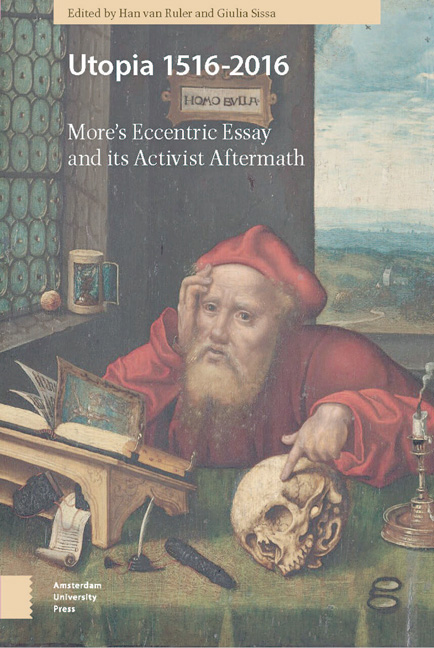Book contents
- Frontmatter
- Contents
- Introduction
- PART 1 THE BOOK
- A Praise of Pain: Thomas More’s Anti-utopianism
- Bodies, morals, and religion: Utopia and the Erasmian idea of Human Progress
- PART 2 ORIGINAL RECEPTION
- Realism Vs Utopianism: The Problem of the Prince in the Early-Modern Netherlands
- From Thomas More to Thomas Smith: Utopian and Anti-Utopian Understandings of Economic Change in Sixteenth-century England
- PART 3 PHILOSOPHICAL CRITICISM
- Reflections on the Utopian Mind
- Utopianism in Today’s Health Care
- PART 4 PHILOSOPHICAL ACCLAIM
- Utopianism and its Discontents: A Conceptual History
- The integrity of Exacerbated Ambiguity: More’s Utopia as an Evaluative Thought Experiment
- Index
Introduction
Published online by Cambridge University Press: 12 December 2020
- Frontmatter
- Contents
- Introduction
- PART 1 THE BOOK
- A Praise of Pain: Thomas More’s Anti-utopianism
- Bodies, morals, and religion: Utopia and the Erasmian idea of Human Progress
- PART 2 ORIGINAL RECEPTION
- Realism Vs Utopianism: The Problem of the Prince in the Early-Modern Netherlands
- From Thomas More to Thomas Smith: Utopian and Anti-Utopian Understandings of Economic Change in Sixteenth-century England
- PART 3 PHILOSOPHICAL CRITICISM
- Reflections on the Utopian Mind
- Utopianism in Today’s Health Care
- PART 4 PHILOSOPHICAL ACCLAIM
- Utopianism and its Discontents: A Conceptual History
- The integrity of Exacerbated Ambiguity: More’s Utopia as an Evaluative Thought Experiment
- Index
Summary
Five hundred years after its first publication, Thomas More's Utopia continues to raise intellectual controversy both as a book and as a concept. Originally written as a traveller's report about a far-away island, the book gave a new name to a classic genre of political fiction and challenged future moral and political thinking with its notion of an ideal society. Alluding to the newly discovered lands that lured explorers and captivated the imagination of readers around Europe in 1516, More placed his ‘Nowhereland’ on the other side of the ocean. Acquiring wide fame and notoriety not as a fantasy place, but as a real example to be followed, the island of Utopia was to become a model for future political constellations, investing the concepts of ‘utopia’ and ‘utopianism’ with the temporal dimension of the belief in a dreamworld to come.
The present collection of articles will explore both the original book and its historical aftermath. Utopia is one of the rare works of Renaissance literature still widely read today, yet it is also a book that even specialists have difficulty to interpret. As so often, many of the articles in this volume emphasize the uncertainties and ambiguities in More's text. Should we see the book's description of a political alternative to Renaissance European society as a serious recipe for a golden future, or are there further layers of interpretation to be uncovered, and other motivations hidden in More's project? Past and present scholars have tried to relate the political ideas put forward in Utopia in a consistent way to the complicated biography of the Man for All Seasons. Some have chosen for a literal interpretation, and see the book's recommendations as serious suggestions for altering society's rules and social arrangements, including, for instance, the introduction of community labour and communist law. Others, however, have noted that Utopia is in fact a dialogue between friends, which would offer More lots of opportunity for experiment, and his readers a certain flexibil ity of interpretation. Wayne A. Rebhorn, for instance, argued that the dialogue form offered More a welcome chance for dissimulation:
By writing a dialogue, More could hide behind his characters, claiming that this or that idea was not his, but merely belonged to one of them (…).
- Type
- Chapter
- Information
- Utopia 1516-2016More's Eccentric Essay and its Activist Aftermath, pp. 7 - 22Publisher: Amsterdam University PressPrint publication year: 2017



